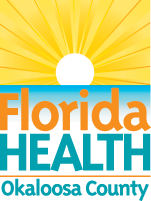It's a New Day in Public Health.
The Florida Department of Health works to protect, promote, and improve the health of all people in Florida through integrated state, county, and community efforts.
Smokeless Tobacco Use Remains A Problem - Through With Chew Week
February 16, 2017
Smokeless Tobacco Use Remains A Problem
DOH-Okaloosa and Tobacco Free Florida are raising awareness during “Through with Chew Week”
Contact: Ryan Mims
HealthyOkaloosaPIO@flhealth.gov
(850) 833-9240 ext. 2162
Cell: (850) 420-2198
Fort Walton Beach, Fla. – The Florida Department of Health in Okaloosa County (DOH-Okaloosa) and the Florida Department of Health’s Tobacco Free Florida program are raising awareness about the dangers of smokeless tobacco—like chew and dip—during Through With Chew Week. This national public awareness campaign was created to reduce the use of smokeless tobacco among young people, and Tobacco Free Florida aims to help combat this deadly addiction. Through With Chew Week takes place February 19-25, with the Great American Spit Out—a day when smokeless tobacco users join together to quit—on February 23.
Although the youth cigarette smoking rate in Florida decreased over 50 percent between 2012 and 2016, the number of Florida high school students who reported current use of smokeless tobacco products decreased only 24.5 percent in those same four years.[i] The disproportionately higher rate of smokeless tobacco use in rural areas is also alarming – current youth smokeless tobacco use is more than three times higher in rural communities than in non-rural areas.[ii] 3.8 percent of youth ages 11-17 in Okaloosa County reported current use of smokeless tobacco products in 2016, according to the Florida Youth Tobacco Survey.[iii]
“Since 2012, there has been little improvement on smokeless tobacco rates for youth in Okaloosa County,” said Dr. Karen A. Chapman, Director of DOH-Okaloosa. "Overall, tobacco use is still a massive problem for our county, and DOH-Okaloosa continues to work with community partners to address the issue.”
To raise awareness about the dangers of smokeless tobacco use, DOH-Okaloosa is partnering with the Students Working Against Tobacco (SWAT) clubs at Bruner Middle School, Meigs Middle School, Crestview High School and Fort Walton Beach High School—as well as Northwest Florida State College Athletics Department. Activities will take place throughout the week to help students, faculty, and the public understand the risks of using smokeless tobacco.
At least 28 cancer-causing chemicals have been identified in smokeless tobacco.[iv] Smokeless tobacco users have an 80 percent higher risk of oral cancer and a 60 percent higher risk of esophageal cancer and pancreatic cancer compared to non-users.[v] Apart from cancer, smokeless tobacco users can develop other oral health issues, such as mouth sores, gum recession, tooth decay and permanent discoloration of teeth.[vi] The use of some types of smokeless tobacco products is also associated with an increased risk of heart disease and fatal stroke.[vii]
Currently, there is no scientific or medical evidence that proves smokeless tobacco use is an effective method to help people quit smoking. Floridians who want to quit any form of tobacco have access to the state’s free and proven-effective resources. For more information, please visit www.tobaccofreeflorida.com/quityourway
About the Florida Department of Health
The department, nationally accredited by the Public Health Accreditation Board, works to protect, promote and improve the health of all people in Florida through integrated state, county and community efforts.
Follow us on Twitter at @HealthyFla and on Facebook. For more information about the Florida Department of Health please visit www.FloridaHealth.gov.
About Tobacco Free Florida
The department’s Tobacco Free Florida campaign is a statewide cessation and prevention campaign funded by Florida’s tobacco settlement fund. Since the program began in 2007, more than 159,000 Floridians have successfully quit using one of Tobacco Free Florida's free tools and services. There are now approximately 451,000 fewer adult smokers in Florida than there was 10 years ago, and the state has saved $17.7 billion in health care costs. To learn more about Tobacco Free Florida’s Quit Your Way services, visit www.tobaccofreeflorida.com or follow the campaign on Facebook at www.facebook.com/TobaccoFreeFlorida or on Twitter at www.twitter.com/tobaccofreefla.
###
[i] Florida Youth Tobacco Survey (FYTS), Florida Department of Health, Bureau of Epidemiology, 2016.
[ii] Middle School, High School, and Youth indicators. Florida Youth Tobacco Survey, 2016.
[iii] Florida Youth Tobacco Survey (FYTS), Florida Department of Health, Bureau of Epidemiology, 2016.
[iv] World Health Organization. Smokeless Tobacco and Some Tobacco-Specific N-Nitrosamines International Agency for Research on Cancer Monographs on the Evaluation of Carcinogenic Risks to Humans Vol. 89. Lyon, (France): World Health Organization, International Agency for Research on Cancer, 2007 [accessed 2015 Feb 10].
[v] Boffetta, P, et al., “Smokeless tobacco and cancer,” The Lancet 9:667-675, 2008.
[vi] Tomar, SL. “Chewing Tobacco Use and Dental Caries Among U.S. Men,” Journal of the American Dental Association, 1999, 130: 160.
[vii] National Cancer Institute and Centers for Disease Control and Prevention. Smokeless Tobacco and Public Health: A Global Perspective. Bethesda, MD: U.S. Department of Health and Human Services, Centers for Disease Control and Prevention and National Institutes of Health, National Cancer Institute. NIH Publication No. 14-7983; 2014.





Connect with DOH